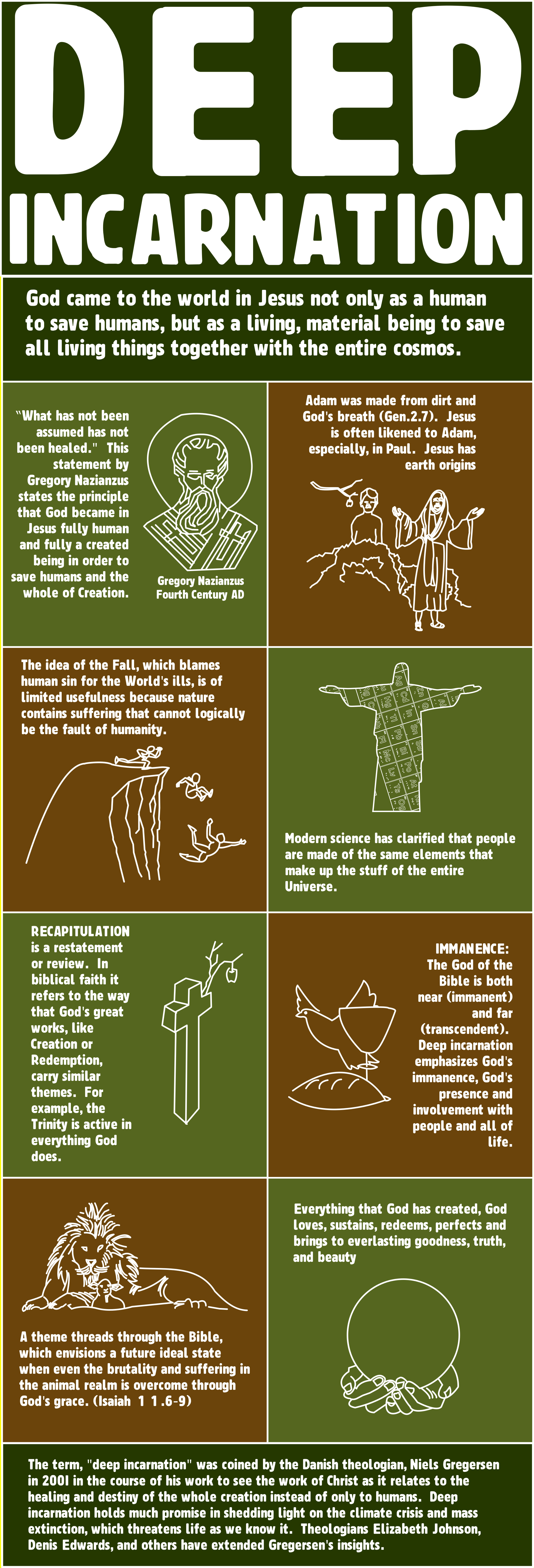What is Deep Incarnation?
It would be misleading to say that Deep Incarnation is a new idea. It’s true that Niels Gregersen, a Danish theologian coined the term in 2001. But the ideas that underlie Deep Incarnation have long been a minor theme in the Church’s thinking throughout its history.
The New Testament is sprinkled with the ideas of Deep Incarnation. The Prologue of the Fourth Gospel proclaims memorably that the “…Word became flesh and dwelt among us.” (John 1.14) One contemporary theologian of deep incarnation, Elizabeth Johnson, ponders at some length John’s choice of words in that verse. Why didn’t he say the Word became “human?” If the Word became more than human by becoming flesh, might the intentions of God when God came to this world may well have entailed more than people. Maybe all that could be called “flesh” was being taken up into Christ’s being. Maybe animals too were being saved and perfected.
Another example, which comes from the Old Testament comes to mind. Noah’s Ark not only saved the people of Noah’s family, but also saved mating pairs from all the world’s animal species. Even back in the primeval history of Genesis we see animals cast not as props for an essentially human drama, but as important in themselves in God’s eyes.
Deep Incarnation in Church History
Elements in Deep Incarnation turn up in the theology of Bonaventure (1221 – 1274) who saw in Jesus Christ a microcosm of the whole cosmos. Additionally, the early theologian, Irenaeus (130-198 ad) wrote extensively against the ideas of Gnosticism. The Gnostics thought of the world as divided into matter and spirit. Matter, they thought was rather shabby. Indeed, the world itself was constructed from inferior matter and was thought of as a temporary dwelling for people. Ultimately, people needed to leave the physical world and ascend into glorious heavenly places. Irenaeus saw the danger of denigrating what God created and argued that the earth would not be discarded but would become the eternal dwelling of perfected people together with their God.
The Influence of Science
Science, especially some of Charles Darwin’s insights about natural selection have contributed to the development of Deep Incarnation. As species develop other species find that they can no longer successfully compete. These lesser adapted species eventually die out or go extinct. Darwin’s insights reveal a living realm that is forever bringing creatures into greater and greater fitness for survival. At the same time the living world is allowing thousands of lesser fit individuals to struggle and die.
We’re keenly aware in our day of the monumental suffering that is an unavoidable part of the development of a more and more fit animal kingdom. Theologians might wonder whether such suffering, which is part of God’s glorious design, is God’s ultimate intention. Deep Incarnation then ponders the extensive suffering among all life forms wondering whether there is a heavenly provision to redeem and bring to perfection even those life forms that have been born, struggled, suffered, and died as part of natural selection’s losers.
Climate Change
Of all the factors that may have prompted thinkers like Gregersen to wonder about the value and destiny of the non-human world, the climate emergency may be the most compelling. The human-driven changes in the earth’s biosphere have raised the prospect that the creatures alive today, including humans, may not survive more than another century or two. Indeed, wild animal populations worldwide are collapsing at a terrifying rate.
Is this okay? What does biblical faith say? What must Christians be doing if anything? Never has humanity been faced with its own extinction. Deep Incarnation is the kind of mega-thinking about the big themes in biblical religion, namely the creation of the world, its redemption or healing, and its ultimate destiny.
Deep Incarnation proposes that the saving work of Jesus Christ is breathtakingly inclusive. All created beings enjoy a special relationship with God and God’s ongoing care. Importantly, all will be brought to joy and perfection in the end times. Put differently, the grace of God is not reserved for a few elect individuals who will be evacuated away from a dying world. Creation is not disposable. It is not okay that species are being allowed to die off and that the atmosphere is being altered in such a way to trap deadly amounts of heat. Climate change is the result of human sin and the suffering that comes from global warming grieves God.
The Importance of Christ
Deep Incarnation focuses on Jesus Christ, particularly on his death and resurrection. The church has long understood that redemption or our deliverance from sin and evil is the unique achievement of Christ who was God and who had taken on human nature. Deep Incarnation extends this idea by point out how Christ assumed more than human nature. If he was a human, he was also an animal. If he was a human he also was composed by the same collection of elements that all matter is composed of.
There are additional ideas that characterize Deep Incarnation. Generally, Deep Incarnation thinkers see the events of Creation, Incarnation, Redemption, and Consummation as similar to one another in their basic character. The theological technical word for this similarity is recapitulation. All are infused with divine live, enjoy the participation of all three persons of the Trinity, and see value in all created things.
The This-Worldliness of the Gospel
Finally, there is a pervasive this-worldliness about all aspects of God’s work whether in creating all things or bringing all things to fulfilment. Biblical religion emphasizes imminence over transcendence. Deep Incarnation theologians remind us that we are always on the right track when we see God moving towards the world rather than calling us out of it.
This infographic emphasizes eight of Deep Incarnation’s most important ideas.

